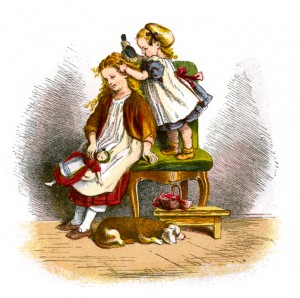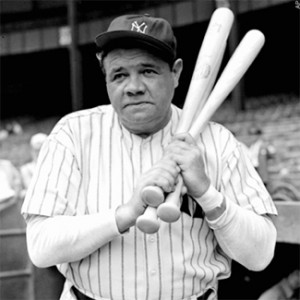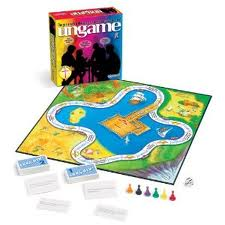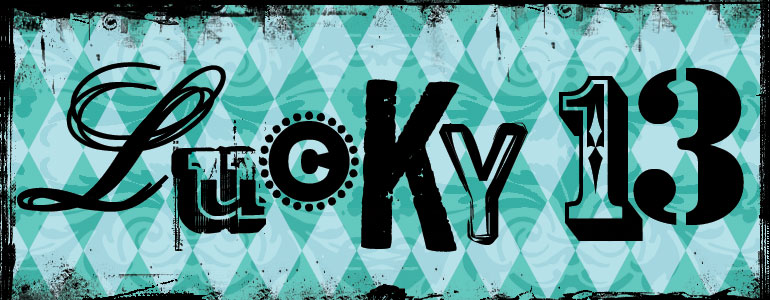Category: Tales From the Writer’s Life
Lucky Thirteen – Thirteen Things I am Grateful for on the Thirteen-Week Anniversary of The Sister Queen’s Release
For the superstitious, thirteen is hardly an auspicious number. And, as those of you who’ve read my blog post at Book Pregnant know, a novel more than three months past its release can start to get lost in the shuffle, leaving its author with a case of the not-so-new-anymore blues. Call me a cockeyed optimist but I choose to face the thirteen-week anniversary of the release of The Sister Queens with a list of thirteen reasons (in no particular order) that I am grateful to be JUST WHERE AND WHEN I AM.
1. My day started with this touching shout out from fellow writer Joey Francisco. Joey reminds us that reading can transport people—even people oppressed by pain and illness—and she challenges authors to “pay it forward” by donating a copy of their work to the book cart at their local hospital. What a timely reminder of the magic of fiction, and what a fantastic service idea!
2. Reviewers have been generous. To date The Sister Queens has received more than three-dozen very positive reviews. Most recently, The School Library Journal declared:
Word on the street (rather, consensus among historical fiction bloggers) is that this is an author to watch whose book is a page-turner, fast-paced, emotional, passionate, well-written and carefully researched.”
3. The Fans are FANTASTIC. I am constantly hearing from new people who love my book and support my writing. Readers, your notes, direct messages, and tweets mean so very much. Thank you. Thirteen weeks on, I am still receiving photos from Queen Spotters around the country. Got another picture of The Sister Queens lounging on a bed inMaine just this past weekend.
4. I’ve been invited to be a Presenting Author at the 2012 Baltimore Book Festival. What better way to spend the last weekend in September? I will be participating in a number of panels including a discussion of “Trends in Historical Fiction” and (oh JOY) a reconstitution of the “Sex and the Historical Novelist” panel that Kate Quinn, Stephanie Dray and I created for our triple-author appearance in April
5. I hit my all-time high Amazon ranking for The Sister Queens in trade paperback on my twelve-week anniversary! Looks like buzz is building sales even if The Sister Queens is not a “new release” anymore.
6. High fives, hand-holding and the occasional shoulder as needed from fellow writers make a solitary profession less so. I’ve never been in a more supportive profession. From the marvelous writers whose blurbs grace The Sister Queen’s cover, to the twenty-nine fellow members of my debut author group, Book Pregnant, the past thirteen weeks have been full of fellow writers willing to lend an ear or a hand as I navigated my debut. Talk about renewed faith in mankind.
7. Team Sophie rocked the postcards. Team Sophie is made up of readers who signed on to share their enthusiasm about The Sister Queens. Their first mission was mailing a few custom postcards to recommend the novel to friends. Team S, you all made a serious dent in my pile of postcards 🙂 and I don’t doubt for a moment that the buzz you generated caused an uptick in sales.
8. Book clubs made me feel welcome. I am now a book-club veteran with both live and skype appearances under my belt (here’s a picture of the Georgia club that provided my first skype date). A chance to discuss the themes and characters in my novel—that’s like chocolate, red wine and good sex all rolled into one. Bless you book clubs. Bless you.
9. My wip (work in progress) feeds my need. Sometimes I love it. Other times . . . it makes me feel like I am trapped under something heavy. But the truth is I can’t live without the magical time-traveling rush I get from writing. So I am happy for my current manuscript which keeps me cocooned in the 16th century.
10. My family reminds me there are more important things in life than how many words I write each day. When the muse doesn’t cooperate and I descend from my office grumpy and fershimmeled the faces of my husband and children remind me the day is still a success in other, more important, ways. And when the muse does cooperate and I forget about making dinner, I am grateful that my family rolls with it (generally) without complaint.
11. The twenty-five readers who reviewed The Sister Queens on Amazon, and the many more who reviewed it on Goodreads took the time to make a difference. You have powerful voices and help others make reading and purchasing decisions. Particularly at Amazon your numbers move algorithms, influencing how often and where my book is recommended to other visitors. Thanks!
12. Nearly 300 people have “liked” either my book page or my author page at Facebook 🙂
13. My agent and my editor had faith in me (and in The Sister Queens). That faith permitted me to step on the roller-coaster that is publication. It’s been a wild ride so far, but I haven’t thrown up yet! That’s something isn’t it?
Here’s to the next thirteen weeks with all their triumphs and trials!
Why I Want Books For Mother’s Day
Mother’s Day is a “brunch holiday.” I detest brunch. There is something so very non-committal about it. Besides, all the best food (not to mention the alcohol to go with it) comes out after dark. In the early years of being a mother I devoted considerable time and energy in the month of April to oh-so-subtly delivering my anti-brunch message (my husband comes from a Mother’s-Day-Brunch family). By the time we had two toddlers I’d given up on subtle and had “Sophie hates brunch” tattooed on hubby’s arm. Let’s face it there is NOTHING relaxing or celebratory about trying to consume a meal in a nice restaurant with two toddlers. And, crazy as it may seem, I’ve always been under the impression that a gift is supposed to delight and relax its recipient.
Motherhood is not, generally speaking, a relaxing occupation. Everything is prone to interruption. Everything. If you are a mother and you’ve been drawn, shampoo-still-in-hair, from the shower by disturbing sounds from elsewhere in your house—sounds suggesting that either furniture or children are being broken—then you know precisely what I mean. The TRULY perfect Mother’s Day gift would be an exotic getaway. A weekend on a beach inBali. Shopping inParis. A day at the spa. Heck, I drive past a Dominican retreat on my appointed motherly rounds, and lately I’ve been thinking a day with the nuns would do wonders for me. Please note, I am not even Catholic.
The truth is, for many of us, an actually physical getaway is pipe dream. There are kids to be delivered to and from a myriad of activities (anyone who’s had a “oh my god I forgot to pick up [insert child’s name here]” moment, raise your hand), homework to help with, etc. And can you just imagine the size of the laundry pile that would await a mother’s return should she actually manage to slip away toBali?
But being a mom is a joy and an avocation. It’s taught me a lot of things including how to live in the moment. After two decades of motherhood I know that I need to both treasure and expect my “me time” in small increments. You have perhaps heard of the twenty-minute power nap? Well, I have become the master of the eleven-minute sitting-in-the-car-getaway. And that leads me to books.
Books offer the perfect, portable, getaway. I may look like I am in the carpool line, waiting for the man with the whistle to call a hundred car engines to life, but I am not. I am in ancient Rome thanks to Kate Quinn’s Empress of the Seven Hills. I am in regency England watching a confirmed bachelor-dandy fall head-over-heels thanks to Miranda Neville. I am spending an afternoon with Catherine de Medici thanks to biographer R. J. Knecht. I am attending festivities at the Valois court with Philippe Erlanger. I am discovering a set of sisters from Provence in a secondary research source on Notre Dame de Paris—sisters who will lead me on an adventure ultimately resulting in the publication of my debut novel, The Sister Queens.
The cost of these getaways is negligible (certainly not in the league of airline tickets to Bali). For the cost of a brunch I’d hate for the five of us, my family can get me a whole armload of books I’ll love and that will fit into my schedule. Yes, I may get snappish when I am forced to put down a novel at a climatic moment to help find a uniform skirt gone missing, or “check” on someone who has already been in bed for an hour but is still not asleep (you know who you are, son). But it’s a lot easier to settle back down on the couch and slip back into the French Revolution with Michelle Moran’s Madame Tussaud than it is to sop up all the water and suds from interrupted tub-time. When I travel by novel I can get back home from Paris for tuck-in time. Try doing that by airplane (especially in a TSA infested air-travel world).
So, husband dearest, books please. Mother’s Day is still more than a week away. Don’t make me tattoo this on your. . . oh, never mind.
The Seventh Inning and No Time to Stretch

I can’t believe it – today marks the 7-week anniversary since launch day for The Sister Queens. Never have weeks rolled by so quickly!
Much of the time I’ll admit I was lost in a blur of blog appearances and promotional duties, so I may have fallen short of my pre-launch pledge to “savor every moment.” But just because I was dazed doesn’t mean I didn’t’ enjoy myself! Highlights included a marvelous Moroccan dinner at the home of a woman who “won” me in a school auction; an on-line author chat where I shared the virtual floor with the talented Christy English; and a well-attended outing at Barnes & Noble where the incomparable Kate Quinn & Stephanie Dray joined me for a lively discussion of “Sex, Lies and History: A Literary Threesome.”
And then of courses there were the reviews. The Sister Queens was privileged (and I was humbled) to receive more than two-dozen on-line reviews from book bloggers and on-line publications during its first seven weeks on the market. If you are interested in reading some of the many good things that have been written about The Sister Queens, check out the “reviews” category here at the blog—it should take you directly to some of my “highlight” posts complete with links to full reviews. Besides these “official” opinions, many readers have taken the time to share what they thought about the book at Goodreads and Amazon. To everyone who has taken a moment to let me know whether by review, letter or email, how you felt about my debut effort, thank you! To all my “queen-spotters” (some of whose pictures dot this post), I appreciate your time, your enthusiasm and your photographic skills. My collage is filling in nicely. Over all then I am feeling pretty grateful to say the least!

But, even as I bask in the glow of a successful release, I know this is no time to take things easy. In the first weeks after its release a book is the latest thing. It’s on all those glamorous, sexy front bookstore tables under signs like “New Releases” or “Notable in Paperback” The internet hums with talk of an author with a new release and of her book. New is exciting. I am not new anymore. But I still want to be exciting! In the next seven weeks, even as I shift my attention more and more to my wip, I will still have an eye on The Sister Queens. I hope you will too oh faithful readers. The optimist inside me says that book lovers—unlike those who find the majority of their entertainment electronically—still have nice long attention spans in a era of sound-bites. Here’s hoping I am right!

Fantasy Casting—Sport of Arm Chair Readers and Writers Alike
I don’t play fantasy sports (real sports either for the record), but as a reader and writer I participate in something similar—fantasy casting. I bet you do too. Certain novels just read like movies, filling my head with images of people, places and situations so vivid that I might be watching the action unfold on a screen. I know EXACTLY who I’d like to see play particular characters in some of my favorite novels but, sadly, no one inHollywood ever rings me up when they are making a movie out of a book and says “cast this baby for us.”
Hence the fantasy casting. Because when real-life constraints—money, an actor’s age, and/or even whether he/she is still among the living—are set aside I can have any book made into a movie starring precisely who I envision in each role. Bliss.
Of course my fantasy cast is not your fantasy cast. And that’s another upside from my point of view. If I prefer Glenda Jackson asElizabeth I (a role she nailed on the BBC before many of you were born) and you prefer Cate Blanchett that’s just fine. We can each pop some popcorn, pull up our respective hassocks, settle down with the very same book in hand and watch the action on the tiny screens in our head featuring our choice. It’s a fantasy remember 🙂
But for some reason while I’ve been busy casting other writer’s historical novels I never thought about a fantasy cast for The Sister Queens . . . until yesterday. That’s when a pair of talented writer friends (Lydia Netzer and Nancy Bilyeau) pointed out how cinemographic my novel is and started making casting suggestions of their own.
Next thing you knew we had a pretty good list going. I knew it was time to share, and more than that to solicit readers’ opinions. So, in a sort of “We’ll show you our if you show us yours” gesture, I am putting our current fantasy casting ideas out on the table and counting on you to reciprocate. Who do you see playing Louis IX? Eleanor? Jean? The Dragon of Castile? DO TELL (that’s what comments sections are made for)!
Fantasy Cast, The Sister Queens:
A Starter List Courtesy of Sophie, Lydia and Nancy
Marguerite: (I’ll admit I see my eldest daughter in this role so thank heavens for the suggestions of others) Romola Garai, Saoirse Ronan, Keira Knightly
Eleanor: (Again my second daughter plays this role in my head): Miranda Otto (remember current age is no impediment), Anna Kendrick, Hailee Steinfeld (right age for start of book but later?), Rooney Mara, Dakota Fanning
Blanche of Castile: Dame Judy Dench, Virna Lisi
Louis IX: Julian Sands (when he was younger), Rupert Penry-Jones (ditto. Or he could play Henry as he currently is), Keith Ledger (told you we included the dead), Alex Pettfer, Raymond Coulthard, Douglas Booth (if he isn’t playing Jean)
Jean de Joinville: Douglas Booth (if you didn’t see him in the recent Masterpiece Great Expectations, click the link—it will be apparent why he is my first choice), Kit Harington (you know, Jon Snow in Game of Thrones), a younger Joseph Fiennes (particular if his brother played Henry), Henry Cavill, Jamie Bell (right age for the start of the action but later?), Jeremy Irvine, Orlando Bloom (who might also play Louis if he put in those contacts he wore for Legolas)
Henry III: Michael Fassbender (yeah he is too good looking – so?), Seth Green, Daniel Auteuil (in younger days), Sean Bean (and for once he wouldn’t have to DIE in a movie), Johnny Lee Miller, Rupert Penry-Jones.
What If You Don’t Like It?
One day after release of The Sister Queens I am offering absolution to those who don’t find it their cup of tea. Come on over to A Bookish Affair and receive official permission to love me but not my book. 
And speaking of loving me . . . pop over to Between the Sheets for your daily dose of Sophie facts. I share with Heather my advice for aspiring authors, and explain why I am a character junkie.
Tell a Friend (or a Non-Friend)
When I became active on social media and started blogging I promised myself I was never going to use those tools to say “buy my book.” I made this vow primarily because such direct shilling makes me profoundly uncomfortable when I am on the receiving end of it.
Now, with the launch of my debut novel. The Sister Queens, only 2-weeks away (March 6th), and knowing as I do how important it is to sell well in the two weeks after the book debuts there is a considerable amount of temptation to break my word. As an individual who embraces “historical” values, however, I still believe “a man’s word is his bond” (ditto a woman’s word). So what to do? Make all the new friends I’ve made on twitter, facebook and through this website feel uncomfortable by hitting them up? Or remain silent and possibly miss sales?
As I tend to do whenever faced with unpalatable choices, I’ve imagined a third option (darn creative types, always imagining things). So today, and without breaking any promises, I am asking you to tell someone else to buy my book. You don’t have to spend a dime of your own money on The Sister Queens if you don’t want to, but please consider suggesting or recommending it to someone else.
How, you may ask, can I do that when I’ve never read The Sister Queens? Ah, but here’s the beauty of my suggestion—I didn’t specify WHO you should tell. If you suspect, based on your virtual acquaintance with me, that I am only good for 140 character quips and I probably should have stuck to Twitter, then recommend The Sister Queens to your mother-in-law, that lady in the next cubicle at work who talks too loudly on her phone about matters of personal hygiene, or any other person you are not particularly crazy about. Sale for me; revenge for you.
If, on the other hand, anything I’ve said in this forum or elsewhere has resonated with you or made you think, “that woman can write,” then please mention The Sister Queens to a friend. It won’t cost you anything and you will be doing me a big favor. Heck you might be doing your book-mad friend a favor too.
Gifts My Sister Gave Me – Part I
Whatever our personal relationship with our sisters one thing cannot be denied – they have shaped who we are. They have given us a personality trait, an ambition, a talent, a tolerance that we would not have had but for knowing them. They have given us a “gift”—even if, in some cases, at the time it was bestowed that gift may have seemed a burden not a blessing.
Next week I want to hear from you about the gifts your sisters have given you. And, to encourage you to share (while celebrating the one-month-to-release mark for my novel), there will be giveaway involved.
But today I want to write about one of the gifts my sister gave me. My sister gave me this writing career. Yes, I know that with my debut novel just about to hit shelves it is a tad premature to declare that I have a “C”areer in writing. Forgive me that for the moment. What I am trying to say is my sister gave me permission to be a writer. More than that she gave me a push.
Once upon a time I was a lawyer—an antitrust litigator to be precise, not that it matters really. I’d wanted to be a lawyer since I was a little girl. Dream realized (check). I should have been happy. I wasn’t. I was casting about for something to be next. Asking a question I hadn’t asked in a very long time, “what do I want to be when I grow up.” I think that’s a much tougher question when you already ARE grown up. So much of who you think you are is wrapped up in your professional success. The idea of making a change is scary. Major anxiety. Major. I can’t do major anxiety without my sister. I am betting over the years there have been times she has fervently wished that I could. But if I am going to obsess, stress out, or break down I am going to call my sister. Doubtless this particular existential crisis involved multiple calls (my sister really should have been getting combat pay), but I remember THE call.
“Writer” wasn’t on the table for “next job” consideration. But what is or isn’t “on the table” doesn’t stop my sister (and I am betting it doesn’t stop yours either) Sisters speak wisdom unexpectedly.
“I know you are making up a story right now in your head,” my sister said. She was right of course and, because she knows me better than anyone, better than I know myself, I didn’t deny it. “Whatever that story is,” she said, “pick up your dictaphone and start saying it out loud.”
My husband, children and I were leaving on a beach vacation, I took my dictaphone with me like my sister told me to. I dictated scenes at the seaside. Later, at home, I used the voice-activated feature to dictate while I washed floors. Most infamously (at least in my family) I dictated a scene in the frozen food section of my local grocery store while a clerk looked suspiciously on (industrial spy anyone?). The book that resulted from my sister’s words snagged my agent. My agent found me my audience.
My sister was uniquely qualified to give me this gift (and my life as a writer is one of the greatest dream-come-true gifts of my life). She knew I was a storyteller. She’s a large part of the reason I became one. As children we had a forty-five-minute walk to school (yes, one way but NOT uphill both ways). I filled that time by weaving “continuing sagas” (the more sensational the better, I fear) for my travel companions. I still remember a sci-fi tale of a color coded world, but the salient point here is that my sister alone (discounting our walking companions who went on to lives and places unknown) was privy to this side of me. In school (high school and college) I was known as more of an essayist – and occasionally a poet – NOT one of those people who constantly wrote fiction and squirreled it away. As I went on to be a mild-mannered (ha) lawyer nobody around me knew about the “other” Sophie. I, myself, may even have temporarily forgotten my passion for storytelling. But a sister never forgets.
So thank you sis. In case I haven’t said it before, in case the dedication in my book didn’t make it clear—I owe you one. A big one.
Not All Sales Are Created Equal – What Your Writer Friends Wish You Knew But Are Too Polite to Tell You
Do you know a writer with a book coming out via a traditional publisher? Even if you are a writer yourself there is something you many not know if you have yet to be published. Something you should know if you want to support published friends.
All sales are not created equal. Even if they are sales of the same title, in the same format for the same price. This is something I didn’t know this time last year.
Interested in learning why it’s important to order or shop for friends’ books early? Come on over to From the Write Angle and read my blog on the subject. Your writer friends will thank you.

My Year In Blogging — A Personal Top 5
In honor of the arrival of 2012 I am taking a look back at my very first year of blogging—2011. Here are the five blog posts—some written for “From the Write Angle” others for my personal blog—that I consider my best work.
The top of my list HAS to be “Voice, It’s Not Just for Manuscripts Anymore” discussing how essential it is for writers to infuse their query letters (the letters they use to try to attract a literary agent) with their unique voice.
I would posit that snagging an agent with a good query is NOT merely about what you say but is equally about HOW you say it. For those of you who have seen “The King’s Speech” (and if you haven’t, forget reading my post and get yourself that DVD) think of the moment at Westminster Abbey when Geoffrey Rush (playing speech therapist Lionel Logue) asks Colin Firth’s George VI of England, “Why should I waste my time listening to you?’ The King’s answer. . . “Because I have a voice.” If you want agents to listen to you, to pay attention to the punchy mini-synopsis of your oh-so-clever plot that you spent a gazillion drafts perfecting, then you’d better let the voice that imbues your manuscript sing out from your query letter as well.
Number two is “Give me A Little Kiss — Sex and the Historical Novelist,” in which I discuss and defend the place of sex in straight historical novels (not just historical romances).
The inclusion of sex in historical novels is neither good nor bad in a vacuum. It’s not the sexual content that determines whether a particular scene works—it’s whether that scene (sex or otherwise) has a REASON for being in the novel. Tossing in an orgy (or even a kiss) into your work of historical fiction without a solid reason is a bad idea. The scene will feel “added on,” and gratuitous sex is no more acceptable in a novel than gratuitous dialogue.
At number three I have selected my reflection on the very act of blogging itself and how it can become a digital distraction from the author’s most important task—writing books:
Blogging takes an enormous amount of time compared to most on-line community participation. A tweet is a quip; a facebook post can be a couple of sentences or a useful link. A blog requires topic selection, thoughtful analysis and a couple of hundred solid words in support of your argument.
So if blogging is such a huge time-suck, why do we do it?
Blog number four tackles the question of why our sisters (or more broadly our siblings) are NOT very much like us.
I’ve certainly had moments when I’ve thought how can my sister and I have had such a different experience of the same childhood or how could we have played the same games (together), walked to the same school (together) and heard the same family stories and yet turned out so very differently? If you have a sibling chances are you’ve had such thoughts as well. At the heart of my questions lay the idea that nurture shapes people, and since my sister and I were raised in the same environment that should have made us similar.
Turns out that’s just dead wrong when it comes to siblings. Being raised in the same environment helps to make us different.
And finally, sitting at number five, is the first blog I ever wrote—“Not THAT Sophie.” This one is all about the marketing lessons I learned from a teething toy. Half-a-year after I wrote it, as I struggle to build my author brand, I still marvel at the power of Sophie the Giraffe. And yes, she STILL comes up before I do in an Amazon search and she continues to top the ranks of baby items.
Coming behind a rubber toy in a “suggested search” list is a humbling experience. But when I looked more closely at Sophie G, I realized I could learn a thing or two. Sophie is NUMBER ONE in the Amazon “Baby” bestseller rankings (we will not discuss how far from number one I am on any list presently). She gets an average of 4.5 stars from reviewers. And she is able to command some serious cash for a figure only 7” tall. In fact, a single giraffe teether costs $7.00 more than a copy of my novel. Wow (hint to readers, buy the book – I don’t care if you chew on it).
Sophie G is obviously doing something right. Here’s what I think. . .
Happy New Year all!!!
I am Game – Using My Son’s Christmas Gift to Get to Know My Characters Better
Writers are always looking for ways to get under their characters’ skins. Only fully realized characters have the ability to make books come to life and please readers. That means knowing far more about each of our characters than readers ever will. We have to “wear” our characters (no, not in a “Silence of the Lambs” way). We have to be able to react instinctively as them to plot points and events in our novels as they arise.
The first step as a historical writer is, of course, historical research. We research, research, and research waiting for that “genesis moment”—the moment when a character’s voice sounds inside our head for the first time. After the “genesis moment” writers have varying techniques for getting to know their characters better (questionnaires, lists of character history and details, etc).
I’ve decided to play a board game with mine. Here, live, on the blog. No kidding.
This year for Christmas my elementary-aged son received “The Ungame.” Don’t feel bad if you’ve never heard of it, I hadn’t either until recently when he started talking about it after playing with a friend. My son is a fairly reticent child – reserved even. So when he came home enthusiastically raving about a game that was all about talking, sharing opinions and feeling, and learning about your fellow players I knew it would be making an appearance under our tree.
As of this writing I have played The Ungame three times. I love the darn thing. It has asked me to reflect upon and answer some pretty significant questions (“What would you do if you were told you were going to die soon?”). I’ve even learned some new things about the man I’ve been married to for more than two decades—a man whose sentences I am fully capable of finishing (though he doesn’t like that so much).
So this morning I thought why not play with my sisters, Marguerite and Eleanor of Provence? Before I begin I hereby declare that I have the actual game board on my desk, that I will be rolling actual dice, and that I will be selecting the top card off the pile (a shuffled pile) when the game requires any player to draw a card. Here goes:
[Sophie—the startling orange game piece—rolls]: 5! That’s an Ungame spot. I get to ask another player a question.
Marguerite, what comes to your mind when you think about your childhood?
[Marguerite of Provence, Queen of France]:
The landscape of Provence; the Court of my father, Raymond Berenger, Count of Provence; and, of course, my sisters. I thought all families were as happy as ours and all courts were as warm and hospitable. [Sighs]
Shall I roll next?
[Eleanor of Provence, Queen of England]:
No Marguerite! It is my turn. We are going clockwise.
[Eleanor—royal purple—rolls]: 6! That’s MightyMountain. Hm, Eleanor has to talk about a time she’s felt challenged by something.
My most recent challenge was acting as Regent of England for nearly ten-months while His Majesty was inGascony. My appointment was outside of English custom and I wanted to do such a good job that none could afterward question the wisdom of Henry’s choice. My largest task was raising money to keep Henry and his troops in the field, and to pay the French to stay out of the conflict. I ended up paying Alphonse of Poitiers (Louis IX ofFrance’s brother) over three-thousand pounds sterling from my own allowance to keep him out of the war.
Your turn Marguerite.
[Marguerite—playing black—rolls]: 1. An Ungame spot. Marguerite draws a question card.
Sophie, to whom can you turn if you need to be comforted?
[Me]:
Doubtless like you, my mind turns immediately to my sister. She’s always loved me unconditionally. If I need to hear a kind word she will provide it—of course if I have a stern word coming she’ll provide that too but only after comforting me.
[All ladies laugh. Sophie rolls again]: 2. An Ungame spot.
[Sophie]:
Marguerite, what is something you want people to remember about you?
[Marguerite]:
That I saved my husband Louis from captivity and likely death in theHoly Land. Because I am quiet and try always to behave in a ladylike manner I fear that people underestimate my will and my ability to act decisively when such action is needed.
[Eleanor rolls]: 5. An Ungame spot.
Marguerite, if you have ever felt ‘brokenhearted’ talk about it.
[Marguerite, hesitates, casts Eleanor a meaningful look, then speaks]:
I have been heartbroken more than once. Early in my marriage I believed myself in love with my husband—I was certainly infatuated. Between the demands of his mother and his God, Louis drew further and further away from me, leaving me very lonely. So Louis broke my heart first, but perhaps nothing is more heartbreaking than the death of a child and I have had that sorrow.
[Marguerite rolls]: 2. Takes a card.
Eleanor, talk about the most loving person you know.
[Eleanor]:
Without doubt my husband Henry. It makes me furious how harshly people judge him. He is no statesman—though it pains me to say it—but he is such a good husband and father. He is entirely faithful to me. There has never been even the rumor of a royal mistress. And he wants me to be happy. He can be a worrier, as during my pregnancy with Edmund when he ordered 1000 tapers kept burning before Saint Thomas Becket’s shrine at Canterbury and another 1,000 at St. Augustine’s, all for the delivery of a second son and my safety. But what woman could fail to see the love underlying such concern? As for the children, Henry is besotted with them. Absolutely besotted.
By the way, am I winning this game? How do we know who wins?
[Me]:
There is no “winner” in The Ungame. It’s an un-competitive learning game.
[Eleanor]:
Pshaw, everything in life has winners and losers. [Turning to Marguerite] But if I must tie then I am happy to do so with my sister The Queen of France.
[Marguerite inclines her head, graciously]
[Me]:
On that happy note I declare our game at an end. Who is in favor of some wine and sugar-coated aniseeds?


